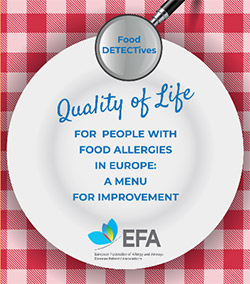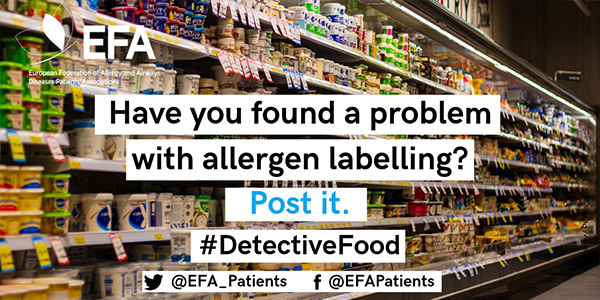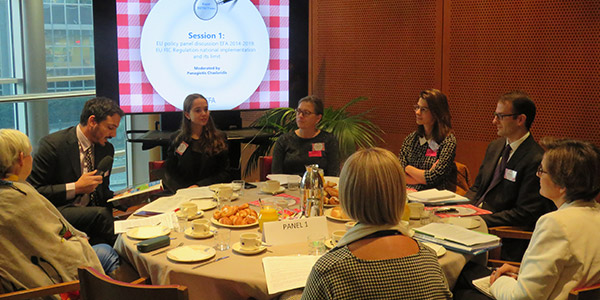In Europe, 17 million people live with food allergies, and the safest option available today remains avoiding the food they are allergic to. Yet this requires patients to be constantly looking for information on allergens. In reality, food allergen information is in many cases difficult to obtain and patients and their caregivers feel forced to develop their own safety strategies, resulting in a higher level of social isolation and discrimination. For this reason, the EU Regulation on Food Information to Consumers adopted in 2011 introduced a harmonisation on the way allergens are labelled, however, there are still gaps between patients’ needs and the information provided by food operators.
Setting up the scene, reaching out to stakeholders
In 2019 EFA launched the Food DETECTives, a baseline project to analyse these gaps and overcome them. Together with the EFA Food Allergy Working Group, we conducted a review of the impact of food allergy on the Quality of Life of people living with it.
Food allergies are not only a concern for people living with them and their caregivers but also for those who are involved in supplying and preparing food. On June 12th we organised a meeting with representatives from the food industry, hospitality and caterers sectors to understand the challenges they face and discuss how the needs of food allergic patients could be accommodated in their environments, including the availability of correct allergen information and staff training of food allergen management
After many internal and external consultations, including data kindly provided by sectoral stakeholders and public authorities, we carried out a patient-centered comparative analysis of the implementation of the EU Food Information to Consumers (FIC) Regulation among Member States.
Food allergens: a menu for improvement
 In December, we published the report “Quality of Life for people with food allergies in Europe: A menu for improvement”, an analytical overview of the state of play in the implementation of the FIC Regulation in several EU countries, taking stock of the main policy trends that affect the Quality of Life of food allergic patients.
In December, we published the report “Quality of Life for people with food allergies in Europe: A menu for improvement”, an analytical overview of the state of play in the implementation of the FIC Regulation in several EU countries, taking stock of the main policy trends that affect the Quality of Life of food allergic patients.
The report highlights the remaining legal gaps, and provides with a set of recommendations for policy makers to improve food allergen policy in Europe. It also singles-out current best practices on food labelling, and addresses food business operators with tips and food management tasks the sector can adopt to implement the regulation in a better way and therefore embrace patients’ needs. The report was consulted online 734 times.
#DetectiveFood, looking for allergens
Food labelling is a daily struggle for people with food allergies, as we witness through the #DetectiveFood social media campaign. We encourage patients to continue linking with EFA with right and wrong examples of allergen labelling using #DetectiveFood, as patients and carers can also #Showleadership posting their day-to-day challenges and good practices on appropriate food allergen information, aiming to improve the existing policy framework on food labelling and ensuring patient safety.
Discussing food allergies in the European Parliament
In December, EFA presented officially the report at a high level event in the European Parliament that brought together key stakeholders on allergies and allergen management, from EU and national institutions, government representatives, clinicians, food operators and patients. During the event, co-hosted by MEP Sylwia Spurek (S&D, Poland) and Stelios Kympouropoulos (EPP, Greece), the European Commission acknowledged the need to take action on Precautionary Allergen Labelling, one of the key recommendations of EFA’s report. In addition, we discussed with experts the much-needed research on allergen thresholds, and came up to the conclusion that setting thresholds could facilitate the definition of reference doses for the 14 allergens currently regulated by FIC.
We are FoodDETECTives
- Professional input from 19 organisations active in various sectors linked with food safety and food allergy
- Case studies from six food allergy patients
- Food management To-Do List for operators, translated into 8 languages
Through 2020, EFA will build on the many recommendations of the report and event to sustain the momentum on food allergen labelling vis-à-vis the EU institutions in the context of relevant policies.

